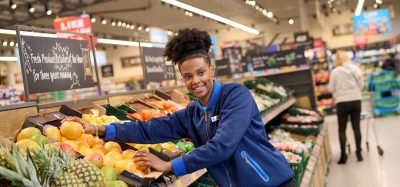Phenomenal women in the food sector
- Like
- Digg
- Del
- Tumblr
- VKontakte
- Buffer
- Love This
- Odnoklassniki
- Meneame
- Blogger
- Amazon
- Yahoo Mail
- Gmail
- AOL
- Newsvine
- HackerNews
- Evernote
- MySpace
- Mail.ru
- Viadeo
- Line
- Comments
- Yummly
- SMS
- Viber
- Telegram
- Subscribe
- Skype
- Facebook Messenger
- Kakao
- LiveJournal
- Yammer
- Edgar
- Fintel
- Mix
- Instapaper
- Copy Link
Posted: 8 March 2024 | Grace Galler | No comments yet
This International Women’s Day, New Food’s Assistant Editor Grace Galler speaks to four women in the sector about their career journeys, discussing achievements, challenges, and hopes for the next generation.


Friday 8 March marks International Women’s Day. A dedicated day in the calendar year to reflect on the inspiring journeys women have been on around to world, acknowledging the strides they continue to make in various spheres of life.
Here at New Food, we wanted to shine a spotlight on multiple phenomenal women in the food and beverage sector who have remained committed to a career in food, celebrating their achievements, resilience, and determination to make a difference.
According to a report, although women make up 49 percent of employees at entry level, women are “underrepresented at all levels in the food industry corporate pipeline, from entry level to the C-suite.”
As times change, so too should the narrative. This International Women’s Day, New Food’s Assistant Editor Grace Galler sat down with Tanya Ednan-Laperouse, Co-Founder of The Natasha Allergy Research Foundation, Abigail Stevenson, Chief Science Officer at Mars, Sarah Knight, Founder and CEO of The Allergy Team and Mecca Ibrahim, CEO and Founder of Women in Food Industry, to discuss the highs and lows of being a woman in food, and, importantly why the next generation of women should consider a career in our evolving sector.
What inspired you to start a career in food?
Tanya Ednan-Laperouse (TEL), Co-Founder of The Natasha Allergy Research Foundation: My stepping into the food sector wasn’t something I ever dreamed would happen. My daughter Natasha had food allergies and in 2016 she died after eating a Pret a Manger sandwich before boarding a plane. The food label on the baguette sandwich didn’t mention the sesame seeds that had been baked into the dough of the bread and she died from anaphylaxis, a severe allergic reaction later that day.
Following her inquest two years later, my husband and I successfully campaigned for a change in the law, now known as Natasha’s Law and our journey into the food sector began. It started with much trepidation, but I knew what we were asking for would save lives and it was amazing to see many in the food industry come right beside us – we were tacking an issue that desperately needed tackling.
Abigail Stevenson (AS), Chief Science Officer at Mars: When I was about eight years old, I vividly remember creating a crystal garden with my dad. Thinking back, this really was my first scientific experiment.
It seems like yesterday when I carefully measured out the different coloured salts using weighing scales and a small spatula – purple, blue, green – following the instructions (my first protocol) very meticulously. I was careful to ensure I added just the right amount of water, then dangling the cotton threads from the lid of the small aquarium so that the crystal structures could grow up them, creating an amazing underwater crystal garden.
I monitored their progress for days on end, curious to learn more about how and why the multicolored structures grew and the shapes they created. Little did I know that the scientific principles I was exploring would end up forming such a critical component of my future career.
From that early age and throughout my career, I’ve continued to explore the connections between science and our biggest challenges, leveraging science principles to solve problems and spark new solutions in areas such as food safety, health and nutrition and sustainability. Yet the world is facing bigger and more urgent challenges than ever before, and as scientists our role in working together to explore and understanding problems, bringing forward novel connections and fresh insights that fuel new solutions has never been more critical.
Sarah Knight (SK) Founder of The Allergy Team: My children both have food allergies and it was my experience of trying to navigate family life with allergies that led me to work in food. I was working as a journalist in television when my eldest was diagnosed and I just couldn’t find the quality information and support I was looking for. A lot of content focussed on how scary the condition is and when I was googling in a fog of worry in the middle of the night, I never knew how reliable the information was that I was reading. Whilst food allergy can be scary to live with, being bombarded with horror stories and being reminded of all the challenges can be paralysing.
What I wanted were practical tools, trusted advice from experts and tips from other parents, to help my family to thrive – when I couldn’t find what I was looking for I left my job in television to create it and The Allergy Team was born. We now work with families, businesses and schools and spend a lot of time vetting the information we share, and supporting parents and carers, school staff and people working in the food business to make life safer and more inclusive for people with allergies.
Mecca Ibrahim (MI), Co-Founder of Women in The Food Industry: I’ve always loved cooking & eating, but never worked in food until 2011. Many moons ago I used to blog about the London Underground. In 2008 I set up a MasterChef for bloggers competition with Cookery School in Little Portland Street called Nom Nom Nom, where London bloggers would compete against each other to produce a sustainable three course meal in 90 minutes & their work was judged by chefs & the public online (we had a Nom Nom Nom reunion last year).
The competition ran annually until 2012 & led to me getting my first paid role in the food industry in 2011 when I was appointed as Head of Marketing & Social Media for the UK’s fastest growing food website – Great British Chefs – the year the company was founded.
What is a significant milestone in your career that you are proud of?
TEL: The day the Government announced that Natasha’s Law would be passed through Parliament on 1st October 2019, was a day I will never forget. The food industry was given a two year grace period to get on board with the law requiring all PPDS foods to carry a full ingredient label with the allergens marked in bold. The coroner at Natasha’s inquest had been very clear; had the food label on the baguette sandwich that Natasha had eaten mentioned sesame seeds, she would be alive today.
Cases of anaphylaxis to food have been rising sharply, it affects both young and old but particularly children and there are now one to two food allergic children in every classroom in the UK. Natasha’s Law given hope to the two million people in the UK living with food allergies and also for people with other health related issued that require the transparency of food ingredients. It has also driven a whole new industry within the sector based on data and since Natasha’s inquest it has become much more common for the hospitality/restaurant sectors to ask their diners/customers if they have any food allergies before they order their meal. We have also been told that the simplification of top 14 allergens in recipes, has made food production easier and helped reduce costs.
MI: There are quite a few things – but the one that was most surprising relating to food was winning three awards at The Good Web Guide for work I had done at Great British Chefs. I was their first marketing & social media lead and we completed a huge amount of innovative digital work in the 8 years I worked there – raised over £150,000 to crowd fund a cookbook, built a monthly Facebook Cookbook Club which had over 30,000 members when I left, created digital content & successful campaigns for hundreds of food clients & built a still thriving social media community of food lovers of over a million across our social platforms. I was invited to The Good Web Guide Awards & we not only won Best Use of Social Media, but also Website of The Year and Best Food & Drink Website to win one award is great – to win three was a huge surprise and an honour.
SK: I am really proud of the Schools Allergy Code that The Allergy Team has created in partnership with Benedict Blythe Foundation and the Independent Schools’ Bursar’s Association. This is a framework to help schools become safer and more inclusive for pupils with allergies. Schools that adhere to the Code can sign up to the Schools Allergy Register which means parents can see if their local school has been assessed as meeting the standards. The Department for Education has recently backed the Schools Allergy Code, and sent it out to all the schools in the country. I am really proud to be a part of this and to support young people with allergies, and parents and school staff.


Knight explains that the Schools Allergy Code is a framework designed to help schools become safer and more inclusive for pupils with allergies.
AS: There is an early milestone in my career that lit up a spark in me. During my PhD, I clearly remember working on a research study that generated exciting new results that challenged current thinking in the field. The insight opened the possibility for new dietary management pathways for stone disease in cats – supporting cats with two of the most common stone types at the same time. Previously stone analysis was required to determine the stone type, and this could take several weeks to complete – until this was done the diet could not be prescribed. I suddenly saw how science discovery could make a difference to the world, making the world better! This inspired me to follow a career as a scientist within industry, seeking out real world problems where science can really unlock new insights that pave the pathway to new innovative solutions.
Is there anything you have found challenging about being a woman in the food sector?
TEL: I have found that given the subject we are talking about and given that I am a mother of a child who died from food allergy and given that I am a voice for all those living with food allergies, my views, focus and drive has been taken very much as Co-Founder of Natasha’s Foundation, I regularly speak to the boards and senior management in the industry across grocery, food-to-go, catering and brands. I have been gratified to see that a number of senior members within the sector are increasingly women but I have found that the subject of food allergies transcends gender as it affects so many people in society.
AS: While I believe that respect is earned, on occasion I feel that as a woman, it is easier to be underestimated based on first impressions. I am sure unconscious bias plays a role here and I encourage us all to consciously hold back from first impressions or assumptions until you get to know someone!
MI: I’m not at the food industry “coal-face” and don’t work in professional kitchens where women are massively out-numbered & under-represented. Working in a marketing role and now as a co-founder means that there are more women in my area of food, however there is still a large amount of man-splaining or being talked over that takes place in this sector. Plus, speaker panels in the sector are still skewed to having more men on them particularly in the more technological side of the food industry.
SK: I am lucky to work with two amazing female Co-Founders and get the most incredible support from them. We are a really strong, ambitious team and have each other’s backs. I would also like to pay tribute to all the amazing mums we support who are juggling work, childcare and the pressures of living with food allergy. The burden of “allergy admin” often falls to mothers and it can feel overwhelming.
For young women considering a career in the food sector, what advice would you offer based on your own experiences?
SK: For me, working on something I feel passionate about keeps me motivated every day. I would really follow what you love and are interested in, because then you’ll work hard and succeed.
AS: If you are a young woman pursuing a career in food or science, I encourage you to stay curious, ask open questions, ask “Why,” actively seek out role models and to really take notice or your allies – both men and women. You may not realize it, but they are probably all around you. For many years, I didn’t see them – and I reflect now on the important role they each played in sparking my early love of science and supporting me throughout my career. Every one of us can lift each other up.
MI: You have got to have a lot of self belief & the confidence to know that your views are just as valid as others. Obviously this comes with experience, as you can’t be afraid of justifying your views and opinions & you need to be sure of your source material to back up arguments. Listening to people and being able to see both sides of an argument is something that many women excel at & those skills are pretty crucial when you are managing people and also want to come across as a person who knows what they are talking about.
Women often talk of having “imposter syndrome” when they are invited to do something not in their natural comfort zone or when they feel they have been asked to do a job or take on a role they don’t feel fully qualified to do. Remember that very few people really have 100 percent of the skills required to do a particular role – they are likely to always be lacking in one area. Focus on your particular skill set and the rest of the skills will usually come with experience or working with (& learning from) people that have the skills you feel you lack. Network, use LinkedIn to the maximum and surround yourself with people you look up or want to be in their shoes one day.
How do you think the food and beverage industry can encourage more young women, especially those in university, to pursue careers in this field?
AS: As I look to the UN statistics, only one in five professionals (22 percent) is a woman. Some 52 percent of the global population are women and their perspective in finding break-through solutions seems rather obvious and necessary. Also, if we think about economic value, GDP could be doubled just by increasing women participation in the workforce.
The future of food, the future health for both people and the planet lies deeply rooted in science. And the only way that science makes a difference in addressing these challenges is if science is translated into practical solutions that make a difference to people in real life situations. We all need to work together to actively encourage the next generation of scientists to enter into a career within the food and beverage industry where scientific theory is put into practice.
MI: The food industry should be an amazing industry to work in. It is creative, it allows you to literally feed and nourish people and it is a sector which once you have learnt skills in one area – those skills are often easily transferable to other roles. As an industry we should encourage this latter point & note that it can be a career for life – rather than something you do on the way to pursuing your “real” career. For example training as a junior chef in a “tough” kitchen could then lead you to work as a private chef with more flexible hours, or a development chef for a food brand, or a nutritionist, or a home economist, or launching your own product range
Women generally have to be flexible and adaptable in their careers, particularly if they take time out to have children or act as carers for elderly parents. At Women In The Food Industry we have seen mature women who may have had careers in finance, law or technology move successfully into the food sector and they act not only as inspiration to others, but have the experience to mentor or act as role models to younger people.
The experience you can bring from other sectors or just having the nurturing life skills of bringing up a family are valuable qualities which make the industry more attractive to those who may not have considered it as a career.
SK: Strong female leaders are crucial to all industries, but especially food where diversity is so vital. How we eat is constantly evolving and having a mix of voices, from every age group, ethnicity, gender is a must. With global, health and financial challenges as they are, creativity, a fearless approach to change and evolution needs to take centre stage to secure the future and young women should be at the heart of this.
Related topics
Related organisations
Mars, The Allergy Team, The Natasha Allergy Research Foundation, Women In The Food Industry
Related regions
Related people
Abigail Stevenson, Mecca Ibrahim, Sarah Knight, Tanya Ednan-Laperouse







